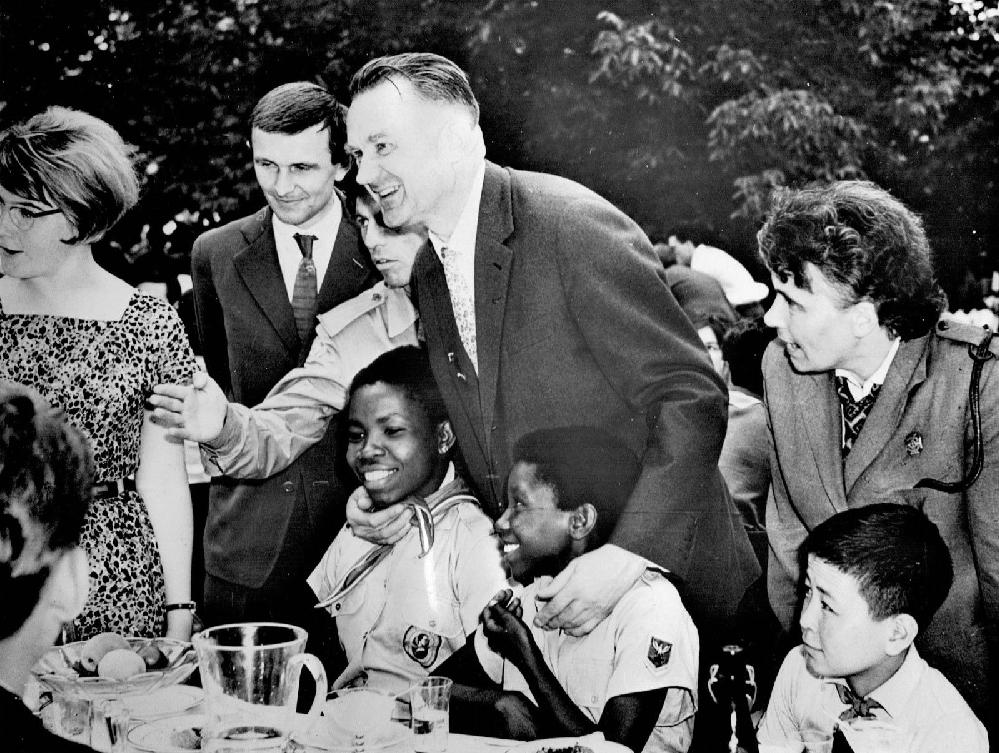
The Cold War: African Country Trends--Ghana

Figure 1.--The Soviets expected the coutries in its Eastern European Empire to follow Moscow's foreign policy dictates. Here we see Polish efforts to promote Communism in Africa and Asia. The press caption read, "Red Stars over Africa: Smiling youngsters from Ghana get plenty of attention from Poland'sDeuty Premier Piotr Jarobzewics at a garden receptionforabout 500 foreign children in Warsaw. Mot Communist infiltration efforts in Africa are centered in trade unions, schools and youth groups." The economic failures of Communism were not yet clear. And Communism/Socialism was still viewed by the leaders in many newly independent countries as a way to rapidly develop their econommies. The photograph is dated August 9, 1962.
|
|
Kwame Nkrumah having led Ghana's independence movement became the country's first president (1957). Ghana was the first black African nation to win independence. Thus Nkrumah believed that he had an important role to play in the struggle against 'capitalist interests' on the continent. He inissted that , "the independence of Ghana would be meaningless unless it was tied to the total liberation of Africa." He not only opposed European imperialism, but capitalism as well. Like many African leaders, he assumed that independence and the adoption of socialist policies would usher in an era of prosperity. He adopted many socialist policies which led a British colony with a healty economy into a prolonged decline. Failing economically at home, he aspired to be a Pan-African leader highly critical of the West. He was a founding member of the Non-Aligned Movement (1961). He was a founding member, but despite the name generally took anti-capitalist, pro-Soviet positions. Nkrumah also adhered to the Casablanca group (Ghana, Guinea, Mali, Egypt, and Morocco). They called themselves neutralists, but in most cases were leaning toward the Soviet Union. One 1962 press report indicated that Eastern-bloc technicians and advisers, including military ones, swarm about in Guinea and are becoming more numerous in Ghana and Mali." [Schwartz] Nhrumah's initial strategy was to encourage revolutionary political movements in Africa. The CIA reports that Nkrumah's government provided money and training for radical Communist-oriented guerrillas at safe camps in Ghana. Ghana received aid from Communist China forthis effort after the 1964 Sino-Soviet split. Several hundred revolutionaries went through this training program in Ghana. It was administered by Nkrumah's Bureau of African Affairs. They participated with insurgencies in Angola, Congo, Mozambique, Niger, and Rhodesia. [CIA] Nkrumah believed that a Ghana, Guinea, and Mali union would serve as the the first step toward a united Africa. They believed it would ignite the African people psychologically and politicaly and eventual lead toward a United States of Africa. Nkrumah was a founding member of the Organization of African Unity. He became a star in the Communist world. He went went on tour through Eastern Europe, proclaiming solidarity with the Soviet Union and the People's Republic of China (1961). [Gebe] The Soviets awarded him the Lenin Peace Prize (1962). It shoul not be thought thar Nkrumah was a Communist following orders from Moscow. He was a Afican nationalist and socialist who thought that socialism would solve Africas problems and whi found the Soviets and Chinese and sources of support. Gahanians might have been more impressed with his Pan-Africanism if it had resulted in economic bebnefits. It did not. Nkrumah suffered domstically because of his focus on Pan-Africanism rather than attentiom to the new nation's increasing economic problems. Nkrumah attacked his critics as being short-sighted. [Rooney, pp. 24–25.] He moved to estblish a one party under the Conention People's Party. Most other early African leaders tablished one-party rule. While Nkrumah was away on a state visit to North Vietnam and China, he was overthrown by a violent coup d'état cobuxted by a Ghanian military and police forces, with backing from the civil service (1966).
Sources
CIA. "IM: Ghana's freedom fighters' camp and the Chinese Communists," CIA FOIA.
Gebe, Boni Yao. "Ghana's oreign policy at independence and implications for the 1966 coup d'état"
Journal of Pan African Studies (March 2008).
Rooney, David. (1988). Kwame Nkrumah: The Political Kingdom in the Third World (St. Martin's Press: 1988).
Schwarz, Walter. "The Cold War & the African states," Commentary (June 1, 1962).
CIH --Cold War

Navigate the CIH Cold War Section:
[Return to Main African Cold War page]
[Return to Main Ghanian independence history page]
[Return to Main Cold War country page]
[Return to Main Communism page]
[About Us]
[Assessment]
[Biogrphies]
[Countries]
[Communism]
[Culture]
[Decolonization]
[Economics]
[Famines]
[Fashion]
[Freedom]
[Hot wars]
[Human rights]
[Inteligence]
[Mass killing]
[Military]
[Pacifism]
[Phases]
[Science]
[Totalitarianism]
[Bibliographies]
[Contributions]
[FAQs]
[Images]
[Links]
[Registration]
[Tools]
[Return to the Cold War Home page]
[Return to the 20th century wars and crises]
Created: 3:49 AM 1/14/2018
Last updated: 3:49 AM 1/14/2018



